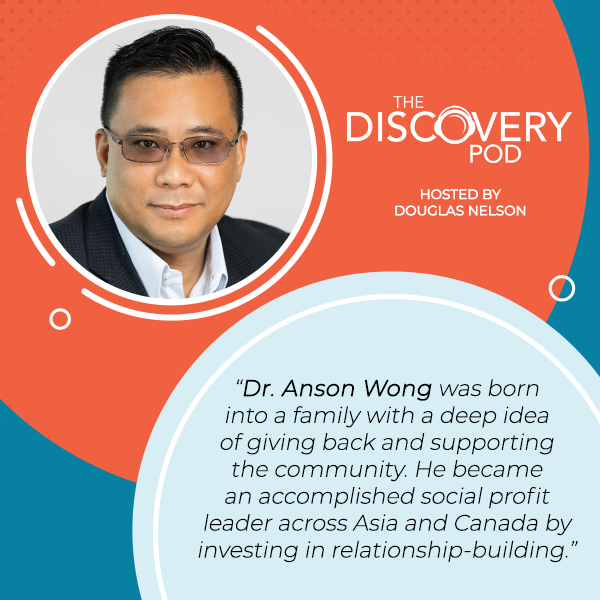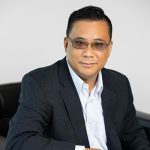
Anson Wong is the Campaign Director at the Discovery Group. He graces this episode to discuss exceptional fundraising strategies influenced by his lifetime of inspiration. Joining Douglas Nelson, Dr. Wong shares insights guided by positive impact and social change on building an effective Asian fundraising program in your organizations. He also delicately dives into the art and science of engaging donors with respect and finesse. If you are thinking of raising money in Asia and working with Asian donors for the betterment of your team, you don’t want to miss this insightful episode with Dr. Anson Wong! Tune in now!
—
Listen to the podcast here
Exceptional Asian Fundraising Strategies With Dr. Wong
On this episode, I’m very pleased to welcome my friend and colleague, Dr. Anson Wong, Campaign Director here at The Discovery Group. Anson is an accomplished social profit leader in Hong Kong across Asia and Canada. Anson’s going to share his insight into Asian philanthropy, working with donors of Asian descent, and developing an effective Asian giving strategy for your organization.
Anson shares his experience, his advice, and exactly what it takes to make a long-term investment to build an effective Asian giving strategy in your organization. If you’ve ever thought about raising money in Asia and working with Asian donors for your organization, you’re going to want to read this. Dr. Anson Wong, PhD, CFRE, CPHR, welcome to the show.
Thank you for having me.
It’s great to have you on and to be able to share some of the expertise that you share with our clients as Campaign Director and the insights that you share with all of us here at The Discovery Group. Anson, as someone who’s done most of his professional work outside of Canada, and you moved here from Hong Kong a few years ago, can you tell our readers about who you are, your career, and how you ended up here at The Discovery Group?
Thank you, Doug. I do consider myself a returning president of the Pacific Northwest. I’d been living in Seattle for almost ten years before my return to Hong Kong in the early 2000s. I’ve always believed in helping people, contributing back to society, and participating in worthy courses that impact the communities. Because of family and employment reasons, I relocated to Vancouver back in 2021 with my wife. I then ventured into doing some volunteer work with a local nursing home for Chinese communities. That’s how I came across The Discovery Group. Now, I work here. Working with fine people like you and other colleagues, I’m blessed to be among you all at The Discovery Group.
It’s wonderful to have you. I do want you to explain to our readers, because you have a rare combination that we don’t often see in the social profit sector, which is that PhD, CFRE. What prompted you to go back? I know you’d been working in the social profit sector before you go back to get your PhD. Talk about your work there and how that pairs with the great campaign work you’re doing.
I’ve been doing community work. At the same time, it’s important to strengthen one’s knowledge and build a credential. After I returned to Hong Kong, I did get a Master’s and PhD in Corporate Social Responsibility and later on Risk Management. I want to put knowledge into the actual work. To be quite frank, I never thought I would be a professional fundraiser after I graduated from one of the leading International NGOs, which has its brand in Hong Kong was looking for a director there.
I didn’t know about the fundraising aspect. I was dwelling on the programmatic work conservation. I then found out that a lot of the work was focused on resource mobilization and high-value donor or higher net-worth fundraising. I slowly, from an amateur fundraiser, became a professional fundraiser. Having the credentials was important. Back in Hong Kong, I was one of the only five CFRE or Certified Fundraising Executives in the Greater China region. That’s quite unique and distinct, to give credibility. It’s useful for my campaign work here as well.
I want to ask this because you’ve mentioned a couple of times about the commitment to giving back and being part of improving the community. Growing up, what were your first experiences with charitable giving or community service? Was there someone in your life that played an important role that demonstrated its importance? How did being involved make you feel?
I suppose it runs in the family. My family has always believed in philanthropic giving and contributing back to society. The fact that it was tradition and family culture, my great-grandfather who started his business, after moving from Mainland China to Hong Kong in the late 1800s always taught the family that we need to go back and do something good for the hometown. Since then, for the past four generations, my maternal side of the family has always been doing philanthropic work, making a charitable contribution back to my hometown in Guangdong Province of China. I suppose that’s how I inherited that. I continue that passion now committing that to my profession. I’m blessed and fortunate to not be part of this field, but working in this field as well.
Not everyone can say, “We hear a lot in our work that the people have fallen into fundraising. I never meant to get into fundraising. I didn’t know what it was before I started doing it.” You were born into the idea of giving back and supporting the community. That’s great to hear.
Thank you very much. I have to thank both my parents and the family. We have always been supportive of different courses and wealthy courses as well. We also have donated a few hundred family items to the Hong Kong Museum of History and being anonymous. It’s a minor kind of thing.
You started by telling us about the work that you did in Seattle and then returned to Hong Kong. Certainly, most of your fundraising experience has been in Asia. I’m curious because we hear a lot where large institutions, post-secondary universities, and hospitals say, “We’re going to start doing fundraising in Hong Kong. We’re going to Hong Kong. We’re going to reconnect with our alumni there.” What they often find is that it doesn’t work out quite as well as they would’ve hoped. Now that you’ve got some significant experience here in Canada, what are the major differences in fundraising practices between Hong Kong and Canada?
It’s a big difference. At the same time, the overall concept or principle might be the same, but there’s no one size fits all solution. That’s the key. Being culturally appropriate is very important. Even Hong Kong as a part of China, part of Asia is diverse, with different ethnicity, and different cultures. One needs to understand through proper research and done a lot of preps. I’m sure all of us know we need to do a lot of prepping right before engaging a donor. That’s the key. The most important thing is being culturally appropriate and respectful.
Can you give me an example of culturally appropriate or showing respect that might not be immediately intuitive to a fundraising professional that spent most of their career in Canada?
In the Chinese community culture, it’s a very patriarchal society. The patriarch of the family is the key decision-maker. No matter whether the next generation is running the show now or not, it’s best for the fundraiser to engage with the patriarch of the family. A lot of the time, the next-gen will say, “A lot of the decision is still made by my father and uncle.” It’s important to understand that aspect. Having said that, the matriarch of the family has become increasingly influential, especially because a lot of financial power of the female individuals in the family has become more prominent.
This year is a record high according to research done by Nikkei Asia. A lot of female philanthropists nowadays call the shots. When the fundraiser, whether in Hong Kong, Singapore, China, or even in the Canadian Chinese community, a lot of the prospective male donors would tell or inform the fundraiser, “My wife or my mother is making the decision. You better talk to them, or I need to check with them.” That’s a key that’s important to know.
One of the other pieces of feedback that we hear sometimes is that it takes a long time to cultivate a gift. The conventional wisdom in North America is it’s 12 to 18 months to cultivate a significant contribution. It could be faster if it’s a capital campaign. Those timelines seem to be longer when you’re dealing with donors in Hong Kong and Asia in general. Why do you think that is or is it North American impatience getting in the way they’re asking?
When we engage with a donor from an Asian background, we need to think outside the box and be innovative sometimes. I would say nothing by the book. It’s because a lot of the time, it’s rooted in connection or relation between the fundraiser and the donor and then the donor themselves within the family. There are sometimes a lot of delicate family dynamics, even with siblings.

Fundraising Strategies: When engaging with a donor from an Asian background, you need to think outside the box and be innovative.
A lot of the time they don’t want to let people know what they are doing. Being discreet is key. Sometimes there are a lot of factors playing. Building trust takes time to make a gift. That’s important to know. Vice versa, sometimes they don’t want fundraisers to tell them what the others are doing already. They hate that. I learned my hard lesson. It is very important when you work with a donor from Asia. They’re sensitive about that.
That’s interesting because often organizations are looking to say who else they’ve given and the level they’ve given as a way of establishing credibility to be in front of a donor, asking them to consider a gift a certain level or a higher level than they’ve given before. It sounds like you’re saying that’s something to do at your own risk in dealing with an Asian donor.
Unless the donor of Asian background has explicitly told you, “There’s no problem. I want my name recognition, the donor recognition. I don’t mind sharing my name to add credibility.” Otherwise, it is always important. It’s almost like a prerequisite or to check with them, “Would you mind if I share your name when you are supporting us?” A lot of them, especially the ultra-high net worth donor, most of the time like to remain anonymous and be discreet.
It’s conventional wisdom in North American fundraising where donor says, “I don’t need recognition.” You have to ask them at least three times because they may be being modest or they feel it’s a transaction for the gift, and they don’t want it to be a transaction. They want it to feel the donor recognition being offered to them is in service to the larger goal of the institution they’re supporting. You’ve got to ask those three times, and most donors end up saying yes by the time you get to the third time. Is it roughly the same ratio in your experience with dealing with donors in Asia, or is it a different conversation altogether?
It’s a different conversation altogether. I suppose the rationale behind it is not so much about recognition, “You need to check with them to get their approval.” It’s rooted in the culture of being modest, humble, and sometimes, “I’m doing good, but why would people need to know what I’m doing or what I’m donating?” This is a different conversation.
A lot of our work here at The Discovery Group is in the Lower Mainland in British Columbia. A lot of the larger organizations we work with have Asian giving strategies. You and I have had this conversation off the show that a lot of those Asian giving strategies don’t quite hit the sweet spot, from your perspective. Maybe you could talk about how organizations here with donors of Chinese background here in Canada, what’s the way to get started with that? What’s the way to build those relationships?
It’s always important and essential to have a conduit, a trusted partner to make the introduction peer-to-peer, senior representation. For example, a trustee or board member who has already given, and then make the introduction for a prospective donor with a prospective donor for a fundraiser. As always, it’s this connection. From there, the fundraisers slowly build the trust. Once the trust is there, I wouldn’t say easily give or donate, but there’s a high possibility there. It’s always the trust and the relations.
One of my observations of the work that you’ve been doing is often having conversations with prospective donors and board members, and much of the conversation, or even all of the conversation and certain interactions have nothing to do with the project or the gift that they may be considering. It is a deep investment in relationship building. I’m curious about your perspective. In that instance, the prospective donors know you’re there because you’re going to eventually ask them for a gift, or does that become clear as the conversation goes on?
I would agree with you that it would take a few times, but they know you are there to ask for financial support, as it has been very clear. Our position is quite explicit. At the same time, it would still take a few rounds or engagement. To proceed to that point that, “I know you are here for my financial support. Let’s fire away,” they will do that after a few rounds. I find out one of the key elements or aspect is having patience is the best virtue for a fundraiser engaging a donor of Asia background. We all know we are very tight to hit, but we have to do that with delicacy and finesse. It’s both an art and a science to doing that.
Patience is the best virtue for a fundraiser that engages a donor of Asian background. Even though there is a very tight goal to hit, this must always be done with delicacy and finesse. Share on XYou’ve pointed out some elements of both the art and the science there, and I certainly have heard you cautioning me in particular about being more patient in some of these conversations. That’s helpful. It is the longer-term nature of a lot of the cultivation cycles that you’re describing, a cultural feature. Hurrying it is not likely to endanger the gift or the potential for a gift, but it sounds fundraiser could come across quite rude if they’re pushing forward too quickly.
I’m afraid I would say yes. I had the hard experience of doing that when I was in Hong Kong doing fundraising. I learned a very hard lesson. Most fortunately, the donors still talk to me. It’s rude, not from my own experience problem, but from other fundraisers with similar donor organizations, especially in an Asia context, it’s extremely rude to “Chase money.” Sometimes we have to be cordial and rushing. That’s the key.
What you’re saying is good advice for any relationship, regardless of the donors’ cultural background, which is this is about a relationship, an investment in a cause that matters to them, and we treat it as a transaction at our peril from us as fundraisers.
We always need to bear that in mind. A lot of donors nowadays, be it in Asia or the rest of the world, are focusing on being strategic philanthropists, not only hearing about a nice story or a case for support. Nowadays, they always look into the social return of investment or environmental return of investment, SROI, or EROI. They look at the impact, not just the buzzword about impact investing or the venture capitalist of philanthropists. They look into what’s the impact there.
It’s what’s the difference their gift is going to make on the cause they’re supporting, for sure.
Exactly.
You’ve been a wonderful guide for us here at The Discovery Group as a member of the team, and navigating a number of conversations with a number of clients. It wasn’t a surprise, but the complexity of even just to say the Chinese Canadian community is many communities with different features and different complexities in all of them. What advice would you have for someone who isn’t of Asian heritage to maneuver in that complex landscape?
That’s an excellent question, Doug, and thank you for the question. It is essential to understand that giving or being philanthropic is generally embedded in different communities in Asia or even China, Canadian Chinese, due to their culture, ethnicity, practice, religion, or tradition. It varies from community to community and donor to donor. There’s no perfect answer here.
The key to being culturally appropriate, and respectful is very important. Also, it’s important to understand the need for a proper set of research before the fundraiser engages the donor. That’s why doing donor research and the prep and also the market survey or feasibility study is the linchpin to a successful donor engagement, especially with a donor of Asia background. You need to understand that being open-minded and thinking outside the box would always be beneficial.
That’s great advice. I want to ask you one other question because it comes up with clients on a fairly regular basis, particularly organizations that are looking to go into capital or a comprehensive campaign. They’re saying, “We have a donor base. It has been roughly the same over the last twenty years or so. We need to have an Asian giving strategy as a part of this campaign.” What advice would you give to directors of development, chief development officers, and CEOs, whose boards are asking them for an Asian giving strategy?
Asia giving strategy needs to cater to the need and interests of the Asian donor. A lot of the time we have ways to generalize in engaging with a different group of donors. No. Again, there’s no one size fits solution and nothing is by the book. It’s key to have a fundraiser who has the knowledge, understanding, and experience of engaging this group of donors. You can never learn that purely from looking at any reference text. That is an accumulation of experience and practice to make that successful. Having an Asia strategy is great. At the same time, you need to have someone who has the knowledge to execute and implement the strategy with Asia donors.

Fundraising Strategies: Fundraisers must have the knowledge, understanding, and experience to engage an Asian group of donors. You can only learn that by looking at references text, which requires accumulated experience and practice.
How important is language proficiency in building those relationships and establishing that trust?
On the surface, a lot of the donors do speak English at the same time. It’s very important to have someone who can communicate in their own language where they feel very comfortable. A lot of the time, in the state or Canada, for example, the Chinese donor speaks fluent perfect English and is native here. At the same time, when they meet the fundraiser, who has the same cultural background and speak the same language, they’re far more comfortable, and they tell you a lot more different story. This opens a whole different window of opportunity. It’s the amount of gifts, the courses of the gift, or the network or context of that particular perspective. It’s important.
Here are two last questions. The second to last question is, what has surprised you most or what’s been the thing that opened your eyes widest about taking your skillset and your experience from Hong Kong and bringing it here?
There are many to mention, but a few standout experiences are in Hong Kong, it’s very Western or international. A lot of the fundraising practices or even when we engage with donors in Hong Kong, Singapore, or in Asia region, they’re very much using a “Western technique.” It works. No problem. The donors there understand that. At the same time, I’ve noticed that donors, particularly, for example, with a strong Chinese background, are very traditional and culturally astute. That’s why when we engage in them, it reminds me of all those traditions and teaching from my grandparents or parents, the family. Tradition and culture are key when you engage a donor with a Chinese background.
Tradition and culture are the keys to successfully engaging donors with a Chinese background. Share on XThat’s interesting. In Hong Kong, there’s more of an openness to the Western fundraising style, and when you come here to Canada, you’re seeing some more traditional perspectives on the role of philanthropy. That’s fascinating.
I’m also learning every day.
On the theme of learning, when I ask you as a member of the team and as a colleague, here’s the question we ask all of our show guests at the end. Anson, what are you looking forward to?
What I most look forward to is continuing to drive and deliver a successful campaign for our partners and clients. The three key elements of The Discovery Group are being exceptional, always learning, and being compassionate. Seriously, all three elements or factors are critical for a successful campaign with our partners. Also, I’m keen to have a two-way dialogue and share the art and science of fundraising with different partners or groups moving forward. I very much look forward to sharing more insights with all of you here in the near future, if I have a chance. This is what I look forward to, having a successful campaign.
Dr. Anson Wong, I appreciate you making time to be on the show. You’ve given a great deal for our fundraising leaders, organizational leaders, and board members to think about when it comes to both raising money in Asia and working with donors of an Asian background here in Canada. I like that there were quite a few surprises in your answers. You said to think out of the box a few times. You delivered your answers. Thank you very much.
Thank you very much, and I’m delighted to be here. Thank you.
Important Links
About Anson Wong
 Dr. Anson Wong is a Certified Fund Raising Executive (CFRE) and Chartered Professional in Human Resource (CHPHR). He brings expertise in philanthropy and sustainability along with an insightful international perspective to his role of Campaign Director at The Discovery Group. With a wealth of experience in global non-profit management, social impact, capital campaigns, and philanthropy, Dr. Wong is a seasoned fundraiser in both Asia and North America and is now a respected consultant for major clients in BC and beyond.
Dr. Anson Wong is a Certified Fund Raising Executive (CFRE) and Chartered Professional in Human Resource (CHPHR). He brings expertise in philanthropy and sustainability along with an insightful international perspective to his role of Campaign Director at The Discovery Group. With a wealth of experience in global non-profit management, social impact, capital campaigns, and philanthropy, Dr. Wong is a seasoned fundraiser in both Asia and North America and is now a respected consultant for major clients in BC and beyond.
His career has spanned PricewaterhouseCoopers, The Nature Conservatory, Conservation International, OneSky for all children Foundation, and The Fred Hollows Foundation. As a long-standing volunteer and board member for various NPOs in Asia and Canada, Dr. Wong has had a lifetime of inspiration making positive impact and social change.



